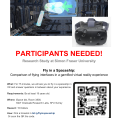
Flying has been a dream for mankind for millenia — but flying interfaces for VR, gaming, and teleoperation (e.g., drones) typically rely on cumbersome double-joystick/gamepads and do not allow for intuitive and embodied flying experiences. Here, we develop low-cost embodied flying interfaces that adapt leaning-based motion cueing paradigms thus freeing up hands for additional tasks beyond just navigating.
Flying in virtual reality (VR) using standard handheld controllers can be cumbersome and contribute to unwanted side effects such as motion sickness and disorientation. This paper investigates a novel hands-free flying interface—HeadJoystick, where the user moves their head similar to a joystick handle toward the target direction to control virtual translation velocity. The user sits on a regular office swivel chair and rotates it physically to control virtual rotation using 1:1 mapping. We evaluated short-term (Study 1) and extended usage effects through repeated usage (Study 2) of the HeadJoystick versus handheld interfaces in two within-subject studies, where participants flew through a sequence of increasingly difficult tunnels in the sky. Using the HeadJoystick instead of handheld interfaces improved both user experience and performance, in terms of accuracy, precision, ease of learning, ease of use, usability, long-term use, presence, immersion, sensation of self-motion, workload, and enjoyment in both studies. These findings demonstrate the benefits of using leaning-based interfaces for VR flying and potentially similar telepresence applications such as remote flight with quadcopter drones. From a theoretical perspective, we also show how leaning-based motion cueing interacts with full physical rotation to improve user experience and performance compared to the gamepad.


